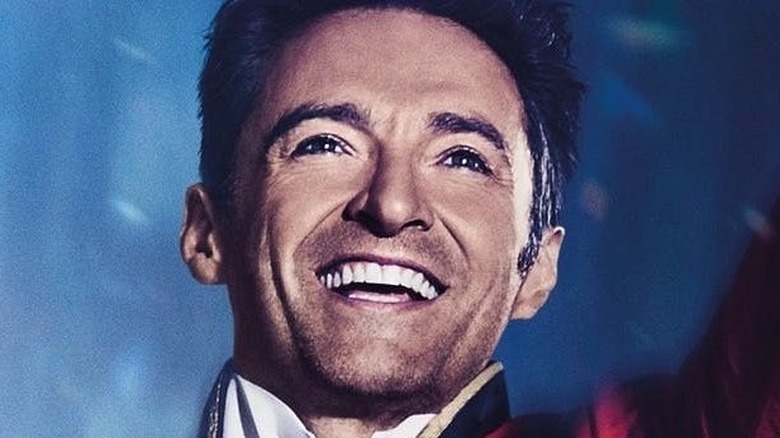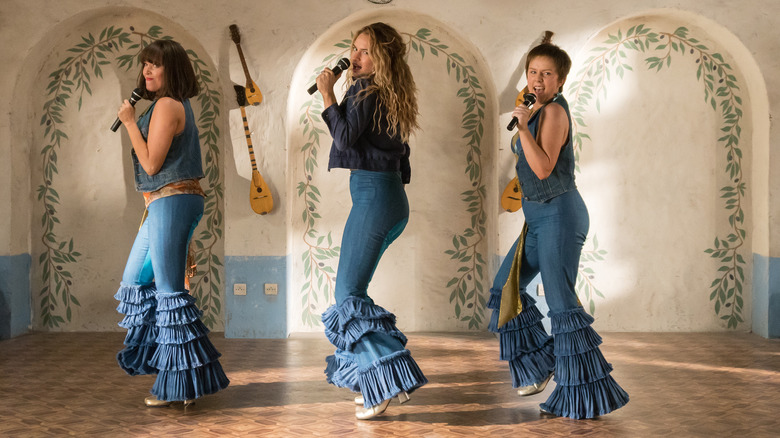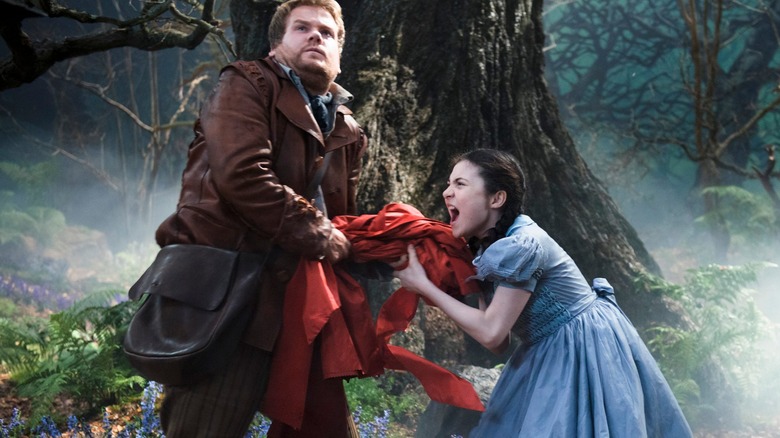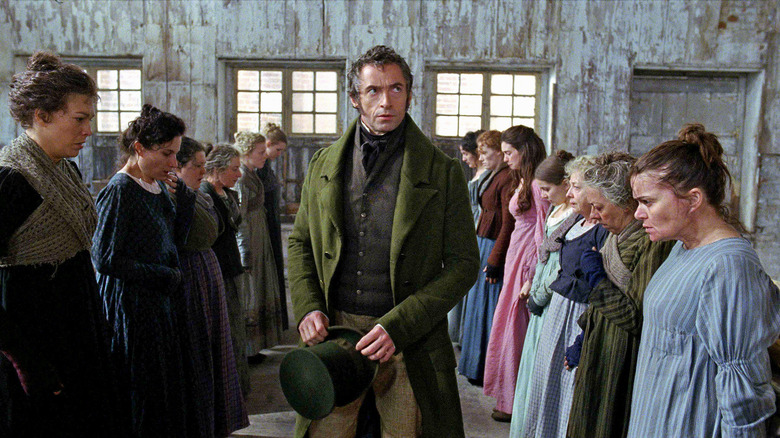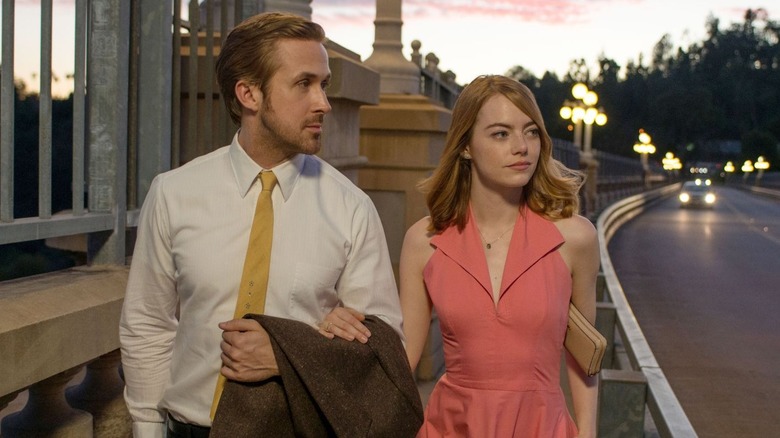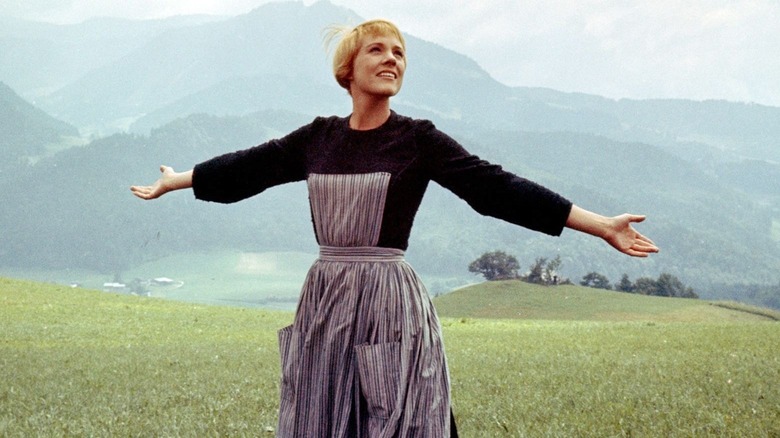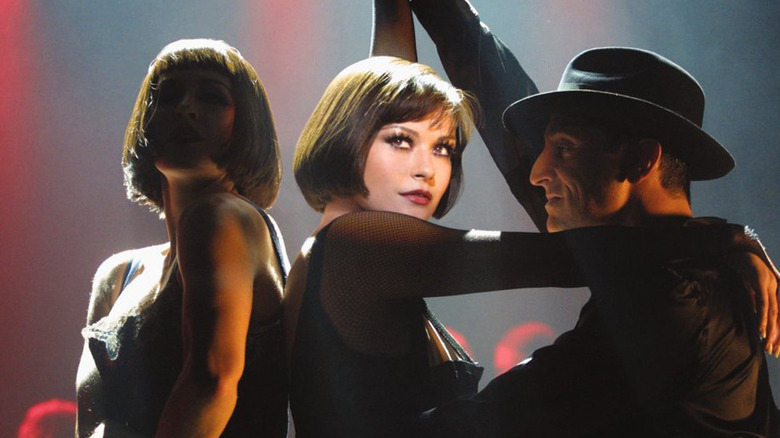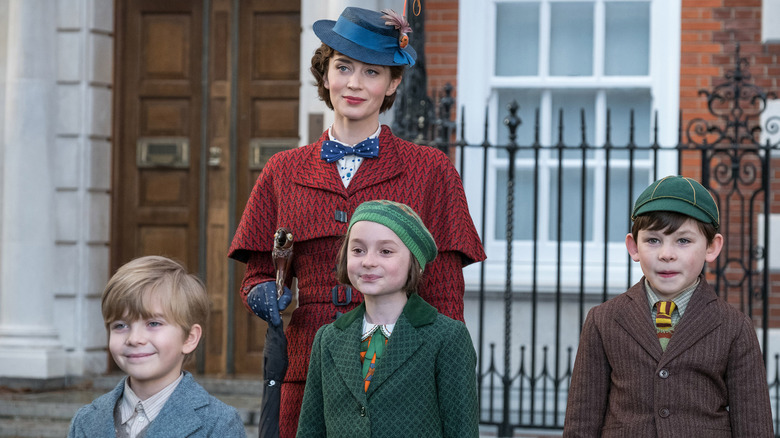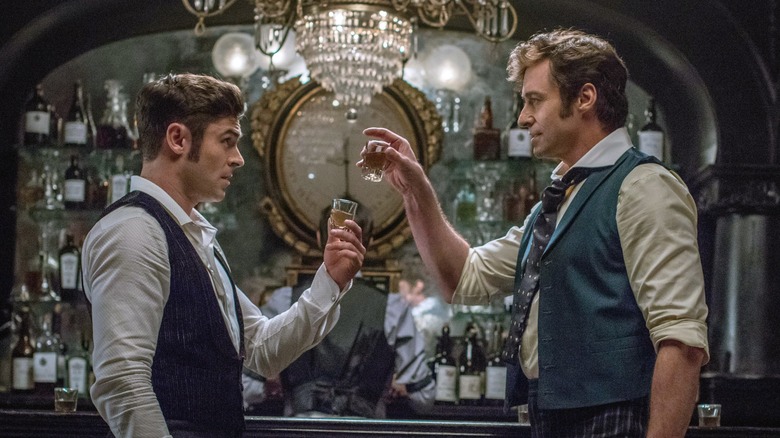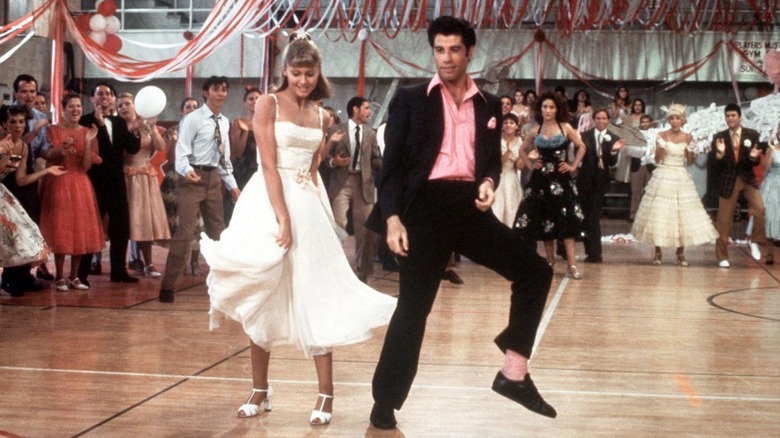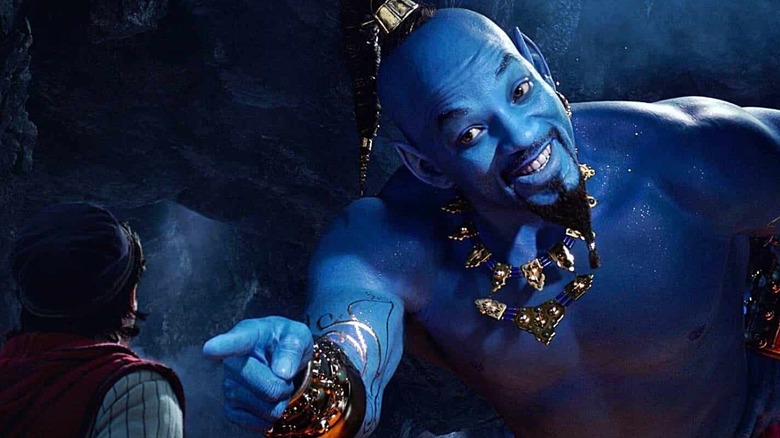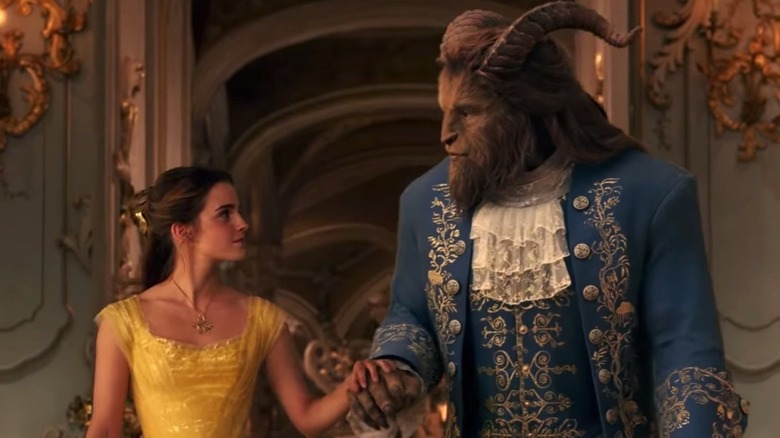The Biggest Live-Action Musicals Of All Time Might Surprise You
When you think of domestic box office hits, you normally think immediately of superhero movies or perhaps nostalgia-packed sequels to movies from the 1980s and 1990s. What you might not expect is that many significant box office champions, particularly in the 21st-century, belong to the musical genre. It's not a form of cinema that is to everyone's taste but it's easy to see why it's so appealing to so many. Musicals always deliver lots of spectacle — all that singing and dancing ensures moviegoers get plenty of excitement for the price of one movie ticket. Plus, many of these musicals open over the December holidays, which gives them a chance to build up word-of-mouth during one of the most lucrative periods of the year.
Examining the biggest live-action musicals of all-time at the domestic box office, it becomes apparent just how popular this genre is and how quietly reliable it's become for delivering box office hits. With new titles constantly raising the bar for how big entries in this genre can go financially, now is as good of a time as any to examine the must lucrative musicals domestically.
Mamma Mia! Here We Go Again
Sometimes, waiting too long to do a sequel only hurts your movie's chances at box office success. Sure, something may be successful on a particular day, but a lot can change over a lengthy period of time. What's hot becomes not very quickly, especially in the film business. The concerns over waiting too long to do a follow-up plagued "Mamma Mia! Here We Go Again," which arrived a decade after its predecessor first took off as a major hit in movie theaters everywhere.
It turned out, though, all that trepidation was misplaced. The sunny bubbly karaoke vibes of the "Mamma Mia!" movies are eternally appealing, with this series not missing a beat in a decade-long absence. Grossing $120.1 million, "Here We Go Again" made less than its predecessor but significantly more than most other live-action musicals. It was an especially impressive bow since one of the key elements of the first movie, Meryl Streep, was largely absent from the sequel and its marketing. While Streep was an important part of the first "Mamma Mia," the success of "Here We Go Again" showed this series had enough appealing elements to withstand anything, including a 10-year break between movies.
Into the Woods
With the release of the "Into the Woods" movie, an intriguing case of the subversive getting absorbed into the mainstream occurred. The original "Into the Woods" musical was a stinging critique of fairy tale norms. However, its feature film adaptation was financed and released by Disney, the ruler of traditional fairy tale fare. Disney wasn't just taking the brand name either; they were releasing a fairly faithful adaptation of the material in hopes of securing some Oscar and box office glory.
Save for a Best Supporting Actress nomination for Meryl Streep and a pair of technical nods, "Into the Woods" wasn't a massive Academy Awards player. However, live-action Disney movies aimed at family audiences have rarely been significant award season juggernauts. Titles like this are typically made to take in lots of money at multiplexes. In that respect, "Into the Woods" proved successful since it turned out to be a domestic hit. Served up in the requisite Christmas musical slot that "Les Misérables" and "Dreamgirls" had occupied in years past, it managed to crack $128.1 million domestically. That was two-and-a-half-times its $50 million budget and substantially higher than typical domestic box office results for live-action musicals. All those familiar fairy tale characters and recognizable famous actors were enough to lure in audiences. Despite being such a dark production, "Into the Woods" got itself a "happily ever after" at the domestic box office.
Mamma Mia!
Sometimes in the summertime, you want something dark. Sometimes, you want a complete antidote to all the upbeat fare populating movie theaters at this time of the year. For others, though, that upbeat fare is just what summer moviegoing is all about. For the latter crowd, "Mamma Mia!" arriving into theaters in July 2008 was tantamount to Christmas coming early. A movie where a bunch of celebrities just belt out covers of ABBA tunes while waltzing through sunny Greece locales — that'll do nicely for entertainment.
Turns out this was just the ticket for many moviegoers judging by the $144.1 million domestic gross that "Mamma Mia!" amassed. "Mamma Mia!" got a major boost from the presence of its big stars and the enduring popularity of ABBA as a band, but it also helped that it got released in the middle of July 2008. The preceding summertime months had been full of superhero fare, gritty action movies and edgier animated entries, so theaters were in desperate need of something a bit lighter. Enter "Mamma Mia!," which was perfect for satisfying the cravings of moviegoers in need of something that could make you go, "How can I resist ya?"
Les Miserables
"Do you hear the people sing?" goes one of the most famous lines from one of the most acclaimed songs in "Les Miserables." If the domestic take of a 2012 film adaptation of that show is any indication, lots and lots of people ended up hearing the people sing. Debuting over Christmas 2012, "Les Miserables" had no problem scoring a sizeable $148.8 million in North American theaters. At the time, this put "Les Miserables" behind only three other musicals at the domestic box office.
The popularity of this musical really cannot be overstated enough. All the movie had to do for a general release poster was to show a young girl with her hair billowing in the wind, the same image used for the original stage show's poster. Just with that image, moviegoers were aware that a highly-anticipated musical adaptation was headed to theaters. However, the production also assembled a star-studded cast to bring the show to life as a bit of icing on top of a famous cake. These included famous song and dance man Hugh Jackman as well as Anne Hathaway in a role that was brief but full of pre-release hype over her one-take musical performance. All these qualities ensured that "Les Miserables" was a movie big enough to make studio executives sing with joy.
La La Land
Most of the biggest musicals at the domestic box office are ones based on previously-existing source material, which can vary from classic Disney cartoons to smash hit Broadway musicals. In the case of "La La Land," though, a notable exception emerged. This 2016 Damien Chazelle title was an original creation not based on any famous property. True, the film took cues from an array of 1950s and 1960s musicals, but it was still technically a fresh new property and one that managed to score massive box office. Grossing $151.1 million domestically, "La La Land" significantly overperformed pre-release expectations and defied all conventional wisdom saying that you needed to be based on a famous property to be a lucrative musical.
First hitting theaters in limited release in the middle of December 2016, "La La Land" was a steady performer that kept on chugging as the months went by. As it racked up more screens to play and more major awards nominations, moviegoers kept returning to see this Ryan Gosling/Emma Stone vehicle. It helped, of course, that the 2016 holiday season didn't offer any other musicals to compete with "La La Land." If you wanted to see some singing and dancing on the big screen, this was your only option. All the acclaim and lack of competition helped this original film reach the kind of box office heights usually seen by musical adaptations.
The Sound of Music
By the end of the 1960s, the American musical was not the moneymaker it once was. Projects like "Doctor Dolittle" inspired far more behind-the-scenes horror stories than they did piles of money and the clichés of the genre had become common fodder for jokes. But before all that, "The Sound of Music" didn't just reaffirm the viability of the musical, it also showed why it was seen as the go-to genre for successful entertainment for so long.
First premiering in 1965, this Julie Andrews-headlined production had no problem quickly becoming a hit. This was partially due to the popularity of the original stage musical it was based on, but also had to do with the fact that star Julie Andrews was coming off another hit musical, "Mary Poppins." All the residual goodwill from that 1964 film ensured that moviegoers were more than ready to see Andrews sing her way across the big screen again. Plus "The Sound of Music" was just really well-liked by the the people who saw it, with the feature receiving widespread positive word-of-mouth the moment it opened. Once "The Sound of Music" won Best Picture at the Academy Awards, the immaculate reputation of this production was solidified. Such a reputation helped "The Sound of Music" endure to such a profound degree in pop culture that its subsequent theatrical re-releases brought it to a $163.2 million domestic total.
Chicago
When "Chicago" came along in 2002, the musical had been dead for a good long while. It hadn't entirely vanished, but musicals had largely faded out in the early 1970s. Only the occasional "Grease" excelled, based on factors like nostalgia rather than any outsized demand for the genre's return. But following in the footsteps of sleeper hit "Moulin Rouge" in 2000, "Chicago" blasted the roof off the domestic box office with its mammoth $170.6 million domestic haul. Maybe the musical wasn't dead after all.
"Chicago" got a significant boost from being based on a popular Broadway musical and also from a wave of award season buzz. As it racked up prestigious wins in the weeks after its late December premiere, the word-of-mouth on "Chicago" got stronger and stronger and persisted in movie theaters for months on end. With audiences seeing it for so long, it's no wonder "Chicago" earned the kind of enormous sum that hadn't been seen by musicals in decades. It helped too that this was the kind of snazzy musical with loads of spectacle that audiences always tend to come out for. With these qualities making "Chicago" a must-see motion picture, a genre that had seemed dead suddenly had a pulse that couldn't be ignored. A new wave of musicals was about to hit theaters and try to ride its coattails.
Mary Poppins Returns
After more than 50 years of being absent from the big screen, Mary Poppins returned to movie theaters everywhere with "Mary Poppins Returns." Julie Andrews sat out this go-round and Emily Blunt was now the one taking over the role of a nanny like no other. The production arrived in December 2018 on the heels of a lengthy marketing campaign and lots of hype as a follow-up to one of the most beloved family movies of all time.
In its domestic run, it managed to gross $171.9 million, a strong haul for any live-action musical and enough to become director Rob Marshall's biggest movie ever domestically outside of the "Pirates of the Caribbean" franchise. If one is curious why a sequel to "Mary Poppins" perhaps wasn't even bigger, it may simply come down to there having been a lot of family movie competition in December 2018. With "Mary Poppins Returns" opening a week after "Spider-Man: Into the Spider-Verse" and two days before "Bumblebee," family moviegoers had a lot of options to choose from and some simply opted out of "Mary Poppins." But the film's relative success was still a testament to how much goodwill this character had built up in her time away.
The Greatest Showman
At one point in the "The Greatest Show," the opening song of "The Greatest Showman," Hugh Jackman's P.T. Barnum declared that his circus was "everything you'd ever want, it's everything you'd ever need." He might as well have been talking about the movie's domestic box office performance, which was utterly extraordinary. After opening to a meager $8.8 million, "The Greatest Showman" appeared to be an also-ran for the Christmas 2017 moviegoing season, trampled by new "Star Wars" and "Jumanji" movies. But then a funny thing happened. This movie just kept going. And going. And going. This film was attracting the kind of word-of-mouth that comes along only once every so often and it was inspiring incredible box office retention.
After scoring one of the greatest opening-weekend-to-second-weekend increases ever, "The Greatest Showman" continued to have surprising holds from one weekend to the next. By the end of January 2018, the musical had already cleared $129 million and it wasn't finished yet. It would eventually gross a staggering $174.4 million, more than double its $85 million budget. It was also more than 19 times its $9 million opening weekend, a testament to just how much positive word-of-mouth this production drummed up. Watching the box office power of "The Greatest Showman" gain more and more steam truly was the "the greatest show" for box office observers everywhere.
Grease
"Grease" is the word that you've heard, full of groove and feeling. But there was a time when pop culture was entirely devoid of this musical, when "Grease" hadn't taken to movie theaters and changed the way everyone saw the words "greased" and "lightning." But riding a wave of nostalgia for 1950s visuals and mainstays that made its way all throughout the 1970s, not to mention the sheer popularity of its various tunes, "Grease" debuted on movie theater screens in 1978 and proceeded to become a massive hit.
With $181.8 million from its initial theatrical run and various re-releases since, "Grease" handily became the biggest live-action musical at the domestic box office for decades to come. It was an already impressive feat made all the more outstanding by when it was released. The late 1970s were not a golden era for musicals. On the contrary, this was an early part of a dark age for the American movie musical, as audience tastes had shifted over to big-budget action blockbusters by this time. But a big bouncy musical like "Grease" could still capture people's hearts and ears, all while shattering box office norms in the process.
Aladdin
Prior to 2017, no live-action musical had ever cracked $200 million domestically (without taking inflation into account). However, that's changed in the modern era as Disney takes their iconic animated musicals and turns them into live-action blockbusters. Suddenly, the heights a musical can hit at the domestic box office are getting redefined on a regular basis. Case in point: the 2019 remake of "Aladdin," which surpassed the domestic hauls of all but one other live-action musical in the history of the domestic box office.
Hitting $356.6 million domestically would have been unthinkable for any other musical and nobody ever thought "Aladdin" would go this high. However, it was always presumed that "Aladdin" would fare significantly better than most simply because its source material is so popular. You hum the opening bars to "A Whole New World" to anyone on planet Earth and they'll know it — that's just one reflection of how popular "Aladdin" is. Plus, this remake had all that Disney marketing behind it, which ensured this movie would be seen as a go-to event for family moviegoers. "Aladdin" set a number of significant box office records in its mammoth domestic box office run, but one of its most important achievements was reaffirming the kind of enormous numbers musicals could pull in.
Beauty and the Beast
While the place that "Beauty and the Beast" protagonist Belle (Emma Watson) calls home is apparently just "a quiet village," the box office performance of the 2017 live-action remake of that classic Disney cartoon was anything but quiet. How could it not be? The trend of live-action re-imaginings of animated Disney features had produced hits before Belle and Beast (Dan Stevens) entered the picture, while the original "Beauty and the Beast" was a massive box office smash when it first hit theaters in November 1991.
Still, few could have predicted just how big this new update on "Beauty and the Beast" would end up being. This level of success was apparent by the end of its first weekend, which saw the movie opening to $174 million, the biggest opening weekend in history for a March release. From there, "Beauty and the Beast" had no problem hitting a massive $504 million domestic gross. At the time, it was just the eighth film in history to crack $500 million domestically and also outpaced all other live-action Disney remakes released up to that point by a considerable margin. Clearly, "Beauty and the Beast" made a lot of noise at the domestic box office despite its lead character hailing from a village that was anything but loud.
